Music, love and faith guided my father’s unique life and challenging death
By Steven L. Denlinger
Father’s Day is coming.
Maybe it’s that time of year when you think about parents. Maybe it’s the fact that my wife’s mother is in the ICU, struggling through a difficult time with her health. Maybe it’s my appreciation for family that drew me back to this time in January 2016, when I finally discovered how much I loved my father.
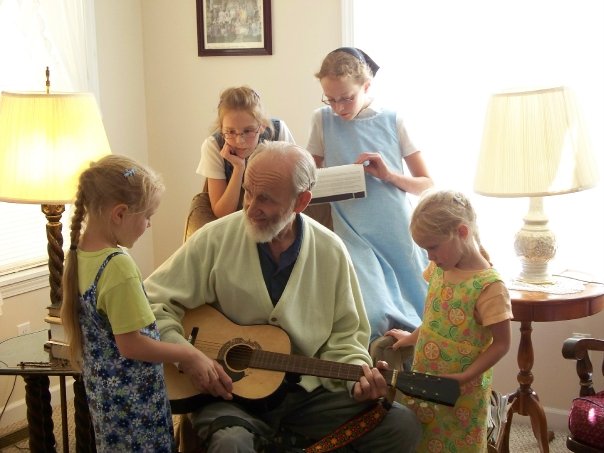
Of course, it was too late to tell him then.
He was gone.
But it’s not too late to share this with you.
As part of this column, I’m also sharing a video taken at the bedside of my father. I listened to this song over and over again, obsessively, after my father had passed.
It was a peaceful way to go — being lifted across the Valley of Death — helped along by the gentle music sung so often within the Amish-Mennonite community in which he chose to live his life.
I stood in front of the church where I grew up, at the pulpit, speaking these words to my extended family and the friends who so loved and admired my father. Not everyone did, of course. Some came because they were curious about this creative, sometimes socially oblivious man who ignored the rules of propriety, who didn’t worry about what people thought — and who fathered me.
So for the first time, I followed his example.
I spoke the words that came to me. I had written them in the early morning hours after waking up sobbing into my pillow in a lonely mansion in Akron where a friend had put me up. I spoke them in an effort to connect with the community I had left, and had now come back a stranger.
I spoke them — and tried to ignore what people thought.
* * *
There are three words that describe Dad, I think.
Music. Love. Faith.
Dad loved music. During his late 70s, Dad and Mom had settled into the brand-new home my brothers and sisters had built for them. My father was working at Altercare, the local nursing home, as the Entertainment Director.
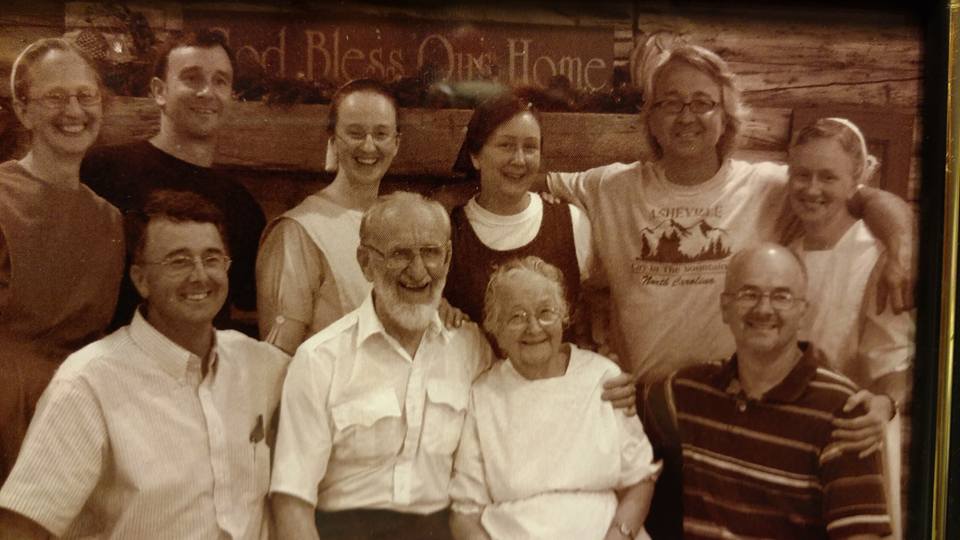
He was playing both his guitar and harmonica for the residents, singing for them and encouraging others to sing. More than one of my friends told me stories about my father playing music at the bedside of dying residents with families requesting him.
I sometimes stopped in to see my father work. One time when he saw me, he convinced me to sing vocals while he accompanied me. He was leading a disparate group of residents in the chapel. So I found myself singing, and my dad playing guitar, to an audience that loved my father.
When I was but a boy in days of childhood
I used to play ’til evening shadows come
When winding down an old familiar pathway
I heard my mother call at set of sun.
What I noticed was the joy Dad brought to his music. He was focused and relaxed and confident. No wonder people request him when they die, I thought. He really knows how to care for them.
I found this ironic: my father was of the age when most men had either passed on, or were in a nursing home. Not Dad. He was working in a nursing home.
Dad also knew how to love. It took me years to see this. When I reflect on that year I spent with my parents, from 2009 to 2010, I remember the shock I felt at beginning to see my parents through the eyes of an adult.

Dad loved helping Mom around the house, and he did so with enthusiasm. He did the dishes on Sundays so my mother could have time off. In the evenings, they played board games together, and the laughter coming from the kitchen sounded like a couple that had just fallen in love.
I remember as a child watching the affection my mother and father showed for each other. There were no puritanical ideas in our home. Dad was always openly affectionate with Mom. We saw them kiss before he went to work, her reaching up to put her arms around his neck. The words “I love you” were a regular part of their conversation.
Most importantly, my father always put my mother’s wishes first.
That wasn’t new. What was new was realizing what love meant to my father. I saw why my father’s marriage had lasted for 58 years. His secret was time and attention. Any time he had a chance, my father chose to spend time with my mother. On his breaks while working at the nursing home, he chose to come home to have lunch with her. This had always been the case as I was growing up, but I’d simply never noticed it before. Perhaps I wasn’t looking.
If it’s true there are love languages, then my father’s language was Gifts of Service. He knew that language well. Politeness, kindness, patience, attention—all of these were skills my father used to strengthen his marriage. It kept his marriage healthy and happy, even in the toughest of times.
The third quality my father owned was a powerful faith. Dad was a prayer warrior. One of my friends recently wrote to me on Facebook, telling me she knew she was on Dad’s prayer list. “Now that he’s gone,” she said, “one of you children needs to pick up Dad’s prayer list and continue praying with it. I don’t want those prayers for me to stop.”
Her comment reminded me of an unforgettable moment from that year I spent at home. I had returned from almost a decade in Los Angeles, and I was feeling pretty beaten up. My parents welcomed me home, their smiles and hugs giving me hope for the future.
In the large basement of my parents’ home, I took one side—a kind of suite with a bedroom, a bathroom, and a desk just outside the bedroom. My father limited himself to the other side of the basement.
I remember one morning waking up and going out to my desk.
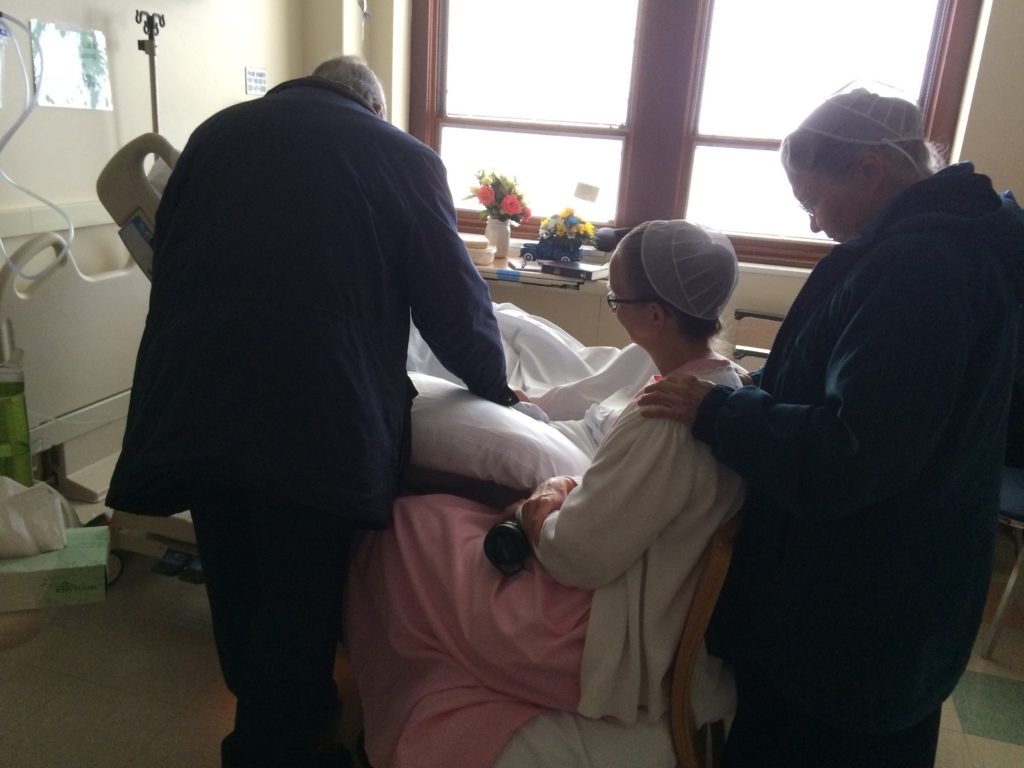
As I booted up the computer, I glanced over. The sun was coming through the window, and it lit my father, who was kneeling at his office chair. I caught my breath. It was like glimpsing a painting. Dad was praying. The light captured the now-ancient lines of his face, the red beard turning gray. The hair on his head was thinner than I had ever seen it. His head was bowed. Before him on the chair lay a sheet of paper. I knew that on that sheet were the names of all the people for whom he prayed.
I’ve often thought about that vision. Watching my father pray was nothing new. As a child and adolescent, I’d seen it happen every morning. My father had a will of stainless steel, and no matter how tired he was, he rose early every morning for his private devotions. He never missed it. Even during the worst financial times, with eight children and a wife to feed, my father took the time to pray. He modeled true spiritual discipline for all of us.
The rest of the world never saw my father pray, not like this. My father took seriously Jesus’ words: “But thou, when thou prayest, enter into thy closet, and when thou hast shut thy door, pray to thy Father.”
My father loved the reel-to-reel recording he had of Flight F-I-N-A-L. This was a musical performance dreamed up by evangelist Forrest McCullough after attending the funeral of his own father. Our father played that performance so often when I was a child, we all had it memorized:
“Welcome aboard Interworld Airlines, Flight F-I-N-A-L, nonstop supersonic service to the New Jerusalem. Your captain is the Lord Jesus Christ, and I am your Chief Stewardess, the Angel of Mercy. You will find your seatbelt in Psalm 23: ‘The Lord is my Shepherd, I shall not want. Yea, though I walk through the Valley of the Shadow of Death, I will fear no evil. For Thou art with me.’ Fasten your seatbelts, please.”
In Dad’s last few days, I struggled to make sense of the grief I was experiencing. The questions lingered. Why would God force my father to go through this much pain? Why build a man with a heart this perfect, and then allow pancreatic cancer to devastate him years ahead of its expiration date?
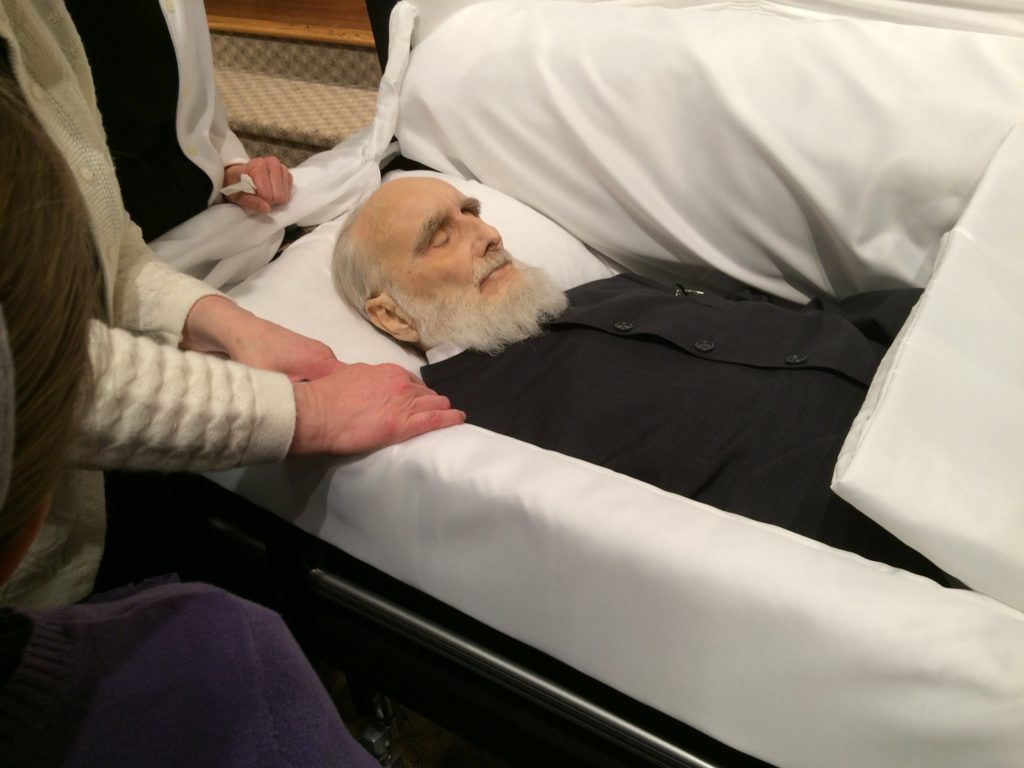
My sister Rose, also trying to understand it all, reflected on what Dad’s body was doing. “God planned for the death of the body,” she said, “in the same ways He planned for its birth. An infant’s body folds up so that it can enter the world. So too, our father’s body is now shutting down its organs, packing them away one at a time, getting ready to close down his earthly life.”
It was a beautiful metaphor. And when I combined Rose’s words with McCullough’s dramatic allegory, the picture of my father’s departure became clear.
During those last few hours, as Dad prepared to leave this world, I imagine his Spirit turned about to take a final look at the recesses of his aging body. It was time. He didn’t need to do much packing: not much to take with him.
I imagine him at the airport with all of us, perhaps limping away from us into the crowded walkways, and eventually through the departure gate of death. He was exhausted from these last few hours of painful struggle, but still able to greet the angel at the gate with his sunny, signature smile. As he moved through, his steps must have firmed up, getting lighter and lighter as he strode up the ramp, ducking to slip into the passenger cabin.
If I know Dad, he took awhile getting to his seat. He needed to say hello to everyone in the cabin traveling with him.
The Chief Stewardess, I imagine, dropped by, ostensibly to offer him a new guitar and matching golden harmonica, but in reality just to get a chance to meet Dad personally before the plane began departure. She probably had to wait. I’m sure Dad was entertaining the cabin, perhaps telling a joke or two, leading them in a favorite hymn, even telling them about how he met my mother, and performing one of her favorite songs.
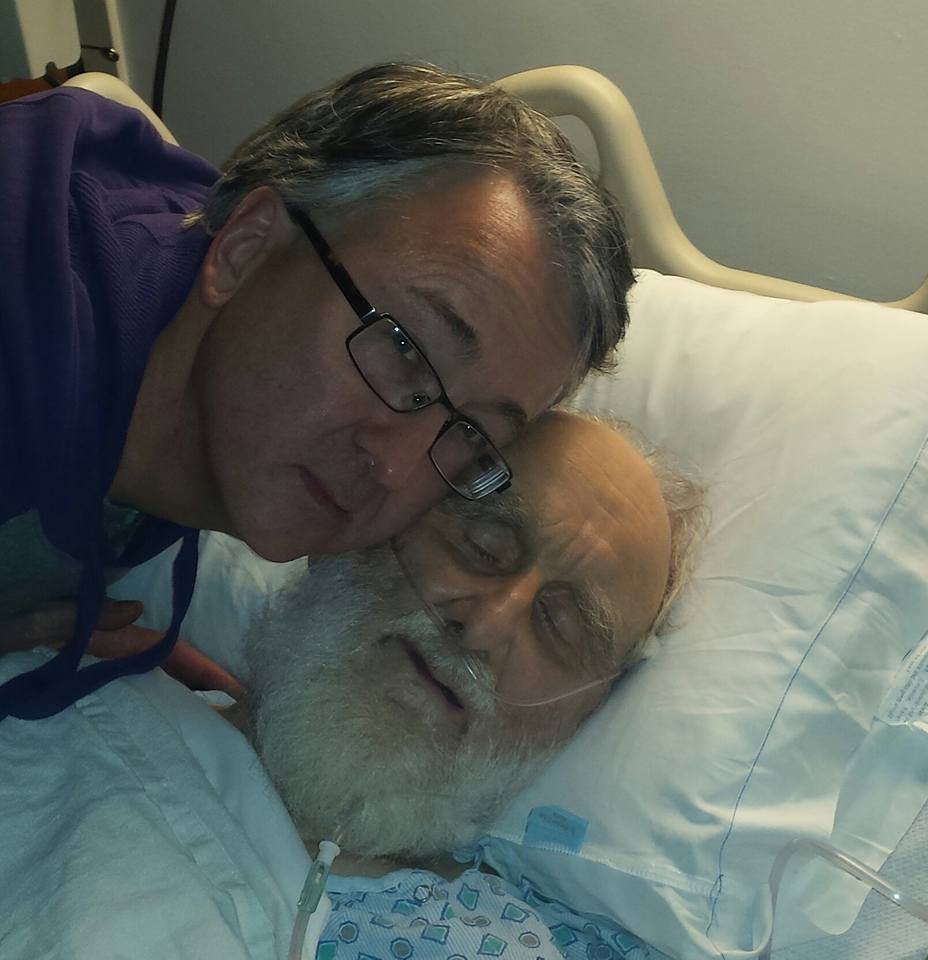
When the four engines fired up, I imagine he took his new guitar, strapped on his seatbelt, and peered out the window. His signature smile returned, stretching from ear to ear. He was ready, no, he was impatient, to begin his own Flight F-I-N-A-L.
I’m sure it was a glorious flight.

Nice, Steven, and a bit teary. A tribute from a son whose love is great.
Steve, I just love this! I love each part. I realize now how much I owe Dad for my love of good interpretation in music. I love the way you pictured Mom hugging Dad before he left for work. So real. And the picture of him praying in the morning by his chair ….. that’s priceless. Thank you so much!